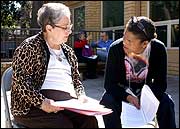UU Jewish community connects at national conference
Conference is first gathering of Jewish Unitarian Universalists in 20 years.
The Rev. Leah Hart-Landsberg, president of UUJA and minister of lifespan faith development at the Unitarian Universalist Fellowship of Gainesville, Fla., said, “Many attendees were thrilled and astonished that there were so many of us, which is a pretty clear indication of the loneliness multi-religious people—and maybe especially the UU Jewish community—can feel in UUism.”
Forty people registered for the conference, held at the UU Congregation of Atlanta, with additional people coming for the keynote speech and an evening concert.
In addition to worship and workshops, time was set aside each day for one-on-one “ChavUUrot” meetings, during which partners discussed topics in more depth. The name ChavUUrot is a play on chavurot, Jewish small group assemblies for planning and discussion.
During these talks and throughout the weekend, participants discussed times when they’ve felt both welcomed and marginalized in their congregations. They shared stories of places that have gotten it right—like the UU Congregation of Atlanta, with its long-running L’Chaim group for Jewish awareness and celebrations. And they discussed others that have tried and failed to “move beyond tokenism,” with well-intentioned but poorly executed attempts at inclusion, such as menorah candles lit in the wrong order and a Yom Kippur potluck.
“It was gratifying to see people garner strength from each other’s stories and differences,” Hart-Landsberg said. “Some themes were heard over and over again, and some others brought unique hurts and joys.”
One of those hurts, which was explored during a workshop called “Israel and Palestine: Roses and Thorns,” grew out of two incidents at the Unitarian Universalist Association’s 2010 General Assembly: a panel discussion sponsored by UUs for Justice in the Middle East called “Human Rights in Israel/Palestine: UU Perspectives” and a proposed resolution to sanction Israel. Several attendees of the UUJA conference described the experience at GA as “painful” and “intensely pro-Palestine” and leaving them feeling both “extremely upset” and “unwelcome.”
“The whole discussion made me feel unsafe,” said Jane Hoey of First Parish in Brookline, Mass. She said conversations surrounding the issue during GA had been one-sided and that those with opposing views felt that their voices were stifled.
The resolution—a proposed Action of Immediate Witness—didn’t pass, but deep feelings of hurt have lingered. The workshop let participants work through these feelings. Hoey described it as “cathartic.” Stephen Sweet, also of First Parish in Brookline, appreciated the opportunity to process his emotions. But he said he wanted to move on to next steps for healing to make him comfortable remaining in Unitarian Universalism, something he said he and some other UU Jews don’t currently feel.
“I don’t want to be accepted—I want to be wanted,” Hoey said. “I want to feel not other. And I feel very, very other.”
Dr. Ibrahim Abdurrahman Farajajé, provost of Starr King School for the Ministry in Berkeley, Calif., gave the conference’s keynote address Saturday afternoon. He told the audience, “It’s time to say new things about holding multiple identities and—radical thought—not having to justify those to anybody.”
“When you know your roots,” he said, “you know that there are other ways of framing questions that go beyond either/or.”
Farajajé stressed the importance of radical inclusivity and helping leaders integrate Jewish ideas for everyone in the congregation to move beyond tokenism and appropriation.
“If we sit around and wait for somebody somewhere to say, ‘OK, now we acknowledge you,’ that’s already too late,” he said.
Saturday evening finished with a Havdalah service and an energetic performance by the Fourth Ward Afro-Klezmer Orchestra. Attendees returned Sunday morning for a final ChavUUrot meeting, closing remarks, and the opportunity to share their impressions of the conference.
Susan Berez of San Diego, Calif., was raised Jewish and got involved with Unitarian Universalism in the 1990s. She and her sister and mother all attended the conference. Berez said it “was a chance to connect with other UU Jews and hear their stories and to invigorate my own feelings and desire to bring Judaism back into my life. It gave me a deep connection.”
Conference attendee Susan Lawrence, managing editor of the UUA’s Tapestry of Faith curricula and a member of both Temple Tifereth Israel and First Parish in Malden, Mass., said, “There are innumerable ways a person can identify as ‘both/and’ Jewish and UU. To me, ‘let us be counted’ means we want our UU congregations to welcome us for who we are. The conference helped me understand the accountability we each have in our UU communities to welcome each person to bring their whole self in. Because that’s what this religion is about.”
Jeremiah Goldsmith-Hopton, who described himself as “Jewish by marriage,” said he attended the conference to learn more about this community of UUs as part of his preparation for ordination as a UU minister.
“I was surprised to learn it’s been 20 years since this sort of thing happened,” he said, “and I hope it won’t be so long until it happens again.”
Though no official plans for another UUJA conference have yet been announced, Hart-Landsberg said there is “a lot of energy to have another gathering and to make it a regular thing.”
After reviewing written comments from participants, she said, “Evaluations expressed strongly that people felt heard, celebrated, nurtured, inspired, connected, and challenged. There were also strong calls for ministers and other folks in our movement who consider themselves Jewish friends/allies to join us, to care about who we are and our needs and gifts.”
See sidebar for links to related resources. Comments powered by Disqus








